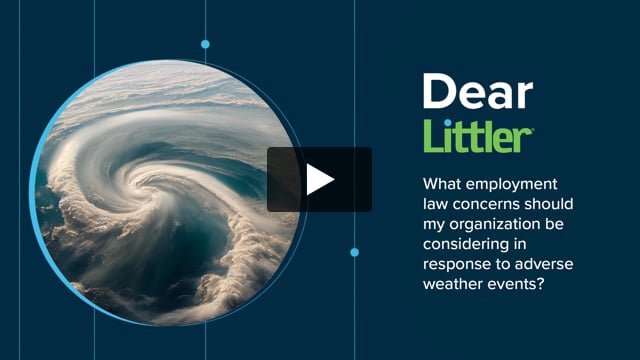Information contained in this publication is intended for informational purposes only and does not constitute legal advice or opinion, nor is it a substitute for the professional judgment of an attorney.
Dear Littler: What employment law concerns should my organization be considering in response to adverse weather events?
Great question! Here are key issues likely to affect employers in the aftermath of these types of unfortunate occurrences:
First, be aware of applicable leaves of absences. Employees may be entitled to certain types of leave to deal with the ramifications of natural events.
- The clearest example of this is FMLA leave – which entitles employees to take leave if they or a family member have suffered a serious health condition. Both physical and mental health conditions qualify for FMLA leave. This would apply to such conditions caused by adverse weather conditions.
- Employers should also be mindful of state-specific laws that may apply. For example, some states have expanded the reasons employees may take paid or unpaid leave to include closures of an employee’s business or their child’s place of care, which could be due to adverse weather-or public health or safety related reasons.
- Employees may be eligible for leave as volunteer emergency responders under some state laws. In addition, the Uniformed Services Employment and Reemployment Rights Act (USERRA) allows employees to take a protected leave of absence for duty in the uniformed services to assist with relief efforts.
Under the ADA and similar state laws, employees who experience a qualifying disability as a result of a natural event may also be entitled to a reasonable accommodation.
In the unfortunate event that an employer is considering facility closings or a reduction in force as a result of storm-related damages, employers need to consider the notification requirements of the federal WARN Act, and any similar state counterpart.
It is also important to pay attention to wage calculations for all employees.
Approach the matter carefully – for example, employers need not compensate non-exempt employees not working because of a storm or natural event – that’s because under the FLSA, and pertinent state laws, non-exempt workers must be paid only for the time they work. But employers need to be consistent when following – and notifying employees about such standards.
The IRS allows employers to make “a qualified disaster relief payment,” to help employees with personal expenses resulting from a disaster without having to withhold pay or income and payroll taxes.
Another set of rules applies for exempt employees. When an employer shuts down its operations because of adverse weather conditions for less than a full workweek, exempt employees must be paid their full salary even if exempt employees work only part of a day.
If an employer is open for business, however, an exempt employee who misses work due to a weather event is considered absent for personal reasons. In lieu of paying salary, an employer may potentially require the employee to use their accrued paid time off to cover all or some of the absence.
However, employees may retain the discretion whether to apply their paid time off balances if there is an overlapping leave of absence or the paid time off is used to comply with mandatory paid sick leave or paid time off laws.
Having clear expectations on flexible or remote work in such situations is also important.
One possible consequence of a natural disaster is the delayed processing of paychecks. It is important to be mindful of state laws and potential penalties for delayed payment – these may still be applicable.
In addition to the topics highlighted, employers may need to consider issues relating to employee assistance programs, property and casualty claims, workers’ compensation inquiries, unemployment compensation, benefits continuation options, and tax reporting duties.
Planning and preparation before natural events occur allows employers to best support their workforces and the stability of their businesses when unfortunate natural events happen.1
See Footnotes
1 For more information on how employers can navigate natural disasters, see Littler Mini Guide – Operating Through Emergencies and Natural Disasters.



